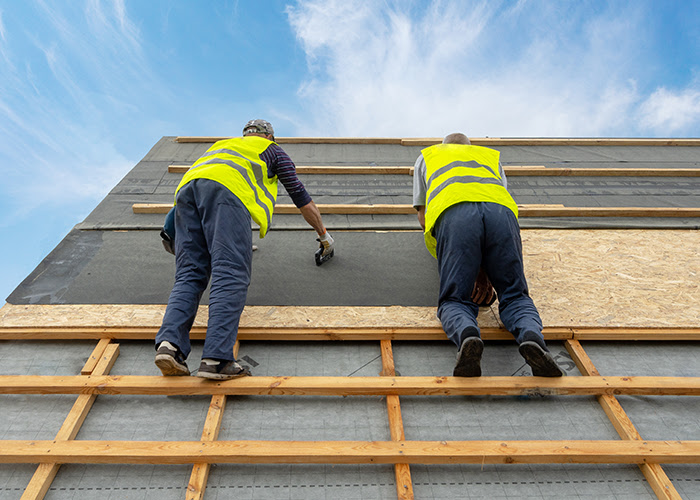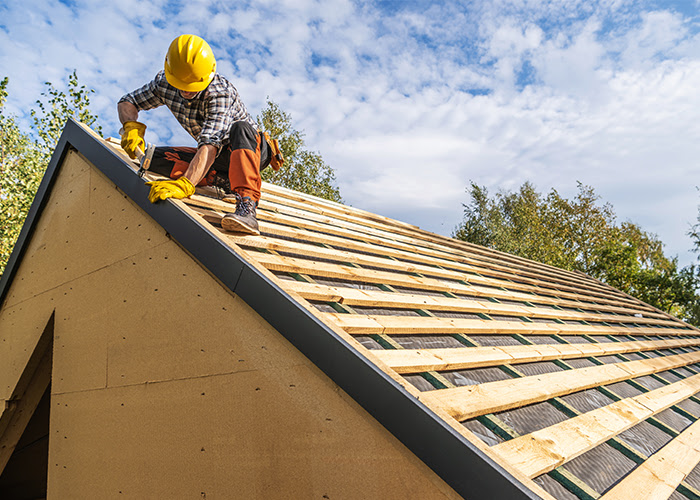Use Texas HB 2102 to Lower Your Roof Deductible Costs
By Shantell Moya · 3 months ago · 11 min read

Storm damage to your roof can easily cost thousands of dollars out of pocket. For years, Texas homeowners have been working with contractors who promised to waive their insurance deductibles for roof repairs. But this practice became illegal when Texas passed HB 2102, so those days are completely over now.
If you break these laws, you might end up with some hefty penalties that include jail time and large fines. And these aren’t empty threats either. We’ll look at the legal requirements along with some legitimate ways you can still manage your deductible costs.
Understanding how this law works can help protect you from criminal charges and keep your insurance company from denying your claim, especially when you need to get that roof fixed.
What You Must Know About Texas HB 2102
Texas HB 2102 sets up some straightforward laws for how contractors need to work with deductibles. The law says contractors can’t waive, pay, rebate, or credit the deductible when roof repairs cost more than $1,000. This means homeowners can’t skip out on the deductible payment, no matter what the contractor might tell them – these laws apply to every repair job that goes over $1,000.
The deductible payment helps protect everyone involved and the insurance company from fraud. Contractors who break this law can run into big problems that could even shut down their business. The state created these laws to stop contractors from inflating claims that end up making premiums higher for all Texas homeowners.
The law puts the responsibility on the homeowner. They have to pay the full deductible amount before any work starts on the roof. Contractors can’t volunteer to cover this cost for anyone, and they can’t work it into their pricing in a way that essentially gets rid of the payment.
For proof of payment, Texas needs proper paperwork. Homeowners need to show canceled checks, receipts, or credit card statements that clearly show the deductible was paid. Insurance companies will probably ask to see this paperwork when going through the claims process. Everyone should keep all receipts from the deductible payment.
Many homeowners think they can find ways around paying their deductible. The truth is that these workarounds just don’t work under Texas law. Contractors who try to help people get around the deductible requirement are actually breaking the law and putting everyone in a bad situation.
Getting caught in deductible fraud can cost thousands of dollars in legal fees. Insurance companies might deny the entire claim if they find out the deductible wasn’t paid. Everyone involved could end up with criminal charges for insurance fraud.
The state takes this seriously because deductible fraud makes insurance costs increase for everyone. When contractors break these laws, they face some big penalties that might include fines and the loss of their license. Some contractors have actually lost their licenses permanently.
The Truth About Waiving Your Deductible
Before HB 2102 became law, Texas homeowners had a real problem with dishonest contractors. These contractors would jack up their invoices to make it look like your deductible didn’t apply. It was a dishonest trick that worked most of the time. If you needed $10,000 worth of work done, they’d write up a quote for $15,000 just to cover whatever your deductible amount was.
Storm-chasing contractors were by far the worst when it came to this. These contractors would prey on homeowners during their most stressful times. They would appear in neighborhoods right after disasters hit, when people were overwhelmed and desperate to get repairs done. They’d roll into town after big storms or other weather events and promise homeowners they could fix everything. Then these same contractors would either do terrible work or, even worse, just leave jobs half-finished. At the same time, honest contractors who refused to play these games would lose business to competitors who were willing to cheat.
The legislature saw that this whole system was hurting everyone except the dishonest contractors. Everything about it was broken from top to bottom. Homeowners would get stuck with poor-quality work or projects that never got finished. Insurance companies had to handle all these fraudulent claims that kept coming in. Honest contractors couldn’t compete against businesses that were cheating their way to lower bids.
Now, here’s what’s important about contractors who still make these kinds of offers today. Any contractor who says they’ll waive your deductible is telling you they’re willing to break the law. They’re telling you they plan to commit fraud and put your name on it. If problems come up later, the roof repair turns into evidence of their criminal activity. You really want to stay away from any business partner who’s willing to work on your roof this way.
Most professional contractors have completely changed the way they market their services since HB 2102 passed. Instead of deductible tricks, they talk about quality work and fair pricing. The difference is obvious when looking at their ads. Honest contractors talk about their experience and the quality of their work. They talk about what actually matters for your home.
Legal Ways to Lower Your Deductible
Now that we understand why Texas HB 2102 exists, let’s talk about how to use it for help. The most direct way to lower roof deductible costs is to shop around for better insurance terms before you need them.
When calling different insurance providers, make sure to ask about their deductible options and how they affect monthly payments. Most insurers have different deductible levels, and the difference in what gets paid each year can add up. A lower deductible means paying more each month. But there’s less out of pocket when it’s time to file a claim.
The monthly budget will show which option makes sense for the situation. Paying an extra $30 per month saves $1,000 when filing a claim. That extra premium ends up being worth it after the first big storm.
The catch is that deductibles can’t just be changed right before a storm hits. Insurance providers have timing requirements that stop people from making last-minute changes, and they usually need at least 30 days of advance warning. Storm season comes whether anyone’s ready or not.
Another solid option is to set up payment arrangements with contractors. Many roofing providers will work with you to spread deductible costs over a few months. But it’s definitely necessary to get these agreements in writing. Having everything on paper matters in these situations.
Texas also has some assistance programs for storm victims, though these vary by county and depend on the type of disaster. It’s worth checking out what’s available in your area before it’s needed.
Legal Problems with Your Insurance
The state takes HB 2102 violations very seriously. If you break this law, you’ll face a Class B misdemeanor charge that can land you in jail for as long as 180 days. And the fine itself can reach $2,000 on top of all that.
Contractors who waive deductibles will get hit with these same penalties, too. Homeowners who go along with these arrangements end up becoming accomplices under the law. Both the homeowner and contractor can face criminal charges when they participate in these deductible waiver agreements. The shared liability affects everyone who’s involved. Your contractor runs into the same criminal problems you do when these deductibles get waived. State prosecutors can go after both the homeowner and the contractor just as hard. Neither party can escape the legal consequences that come from these arrangements.
Insurance providers have their own ways to make sure people follow the law, and they’re getting better at it all the time. They need to see thorough paperwork for every claim, and they can turn down coverage if they find any evidence that someone messed with the deductible. Insurers will request receipts, contracts, and proof that the deductible was paid before they’ll release any funds.
The replacement cost hold-back system actually gives insurers some extra power here. What they do is pay the actual cash value first, then they hold back the depreciation amount until repairs are proven to be done. If they find out the deductible wasn’t paid as required, they can just refuse to release any of that held-back money. Repairs end up sitting there unfinished while those held-back funds stay frozen in place. The insurance company doesn’t have to release any money at all when it finds out about deductible fraud. So homeowners are stuck having to pay for everything out of pocket while also dealing with possible criminal charges.
Homeowners run the risk of criminal prosecution from the state, while at the same time, their insurance company can turn down the claim completely. Those repairs that seemed like they were going to be covered suddenly become something that has to be paid for completely out of pocket.
Since 2019, the enforcement of these laws has become much stricter. Insurance providers now look at roofing claims more closely than they used to and check into any contractor behavior that seems suspicious. They share information with one another about contractors who cause problems, passing it around throughout the whole industry.
How the Payment Process Works
Let’s say there’s a claim with that $2,000 deductible and $10,000 repair we talked about earlier. I’ll talk about what happens with the money – who pays what, and when you need cash on hand.
After the storm hits the house, the damage needs to be checked by the contractor and the insurance adjuster. The contractor will provide the $10,000 estimate, and then the adjuster needs to make sure the policy covers this kind of damage. They have to agree on the damage assessment before repairs can start. In Texas, most people wait about 7-10 days for the adjuster to finish their report.
Once everyone agrees on how much work needs to be done, repairs can begin. Here’s where cash flow gets tricky. The contractor needs payment as the work goes along. But the insurance company won’t send any money until after you send in all the final paperwork.
The contractor still expects payment, no matter when the insurance money shows up. Most homeowners find out that this gap between paying and getting reimbursed puts real stress on their finances.
Most contractors want payment in stages, so it might be $3,000 to start and then $7,000 when they’re done. The insurance company will pay back $8,000 total. But that check usually takes 10-14 days to show up after you send in the completed claim with all the receipts and photos. Those two weeks feel even longer when there’s extra debt on credit cards.
This requires coming up with $10,000 for a while during the wait for that $8,000 payment. The timing matters here because you need enough room on credit cards or enough cash saved to cover the full amount up front. Keep every receipt and take photos of all the completed work.
New Laws Help You Get Better Roofs
When I think back to the days of those “free roof” promises, they can look pretty nice. But these new laws end up helping homeowners. The law gets rid of the confusion and fraud that used to happen and makes it easier to get quality roof repairs. Yes, the deductible needs to be paid up front, and this cost can hurt the wallet in the beginning. But this law makes sure that both homeowners and contractors are following the right procedures to protect everyone.
The strategies we’ve talked about – shopping around for better insurance terms, building up savings for repairs down the road, and finding contractors who have payment plans – these give real ways to handle the costs without doing anything illegal. These methods let you control roof spending while staying on the right side of the law.
What I’ve learned since this law started is that contractors who are up front about following HB 2102 are usually the ones worth hiring anyway. They’re honest about what the law needs, straight about their prices, and they care about doing quality work instead of taking shortcuts. This honesty matters when you’re picking who works on your home.
At Roof Republic, we work on both business and home roofs, and we’re based right here in Texas. We mostly work in the Houston area and the neighborhoods around it. Give us a call now for a free inspection, and we’ll take care of your roof correctly.










Comments
Sort by: